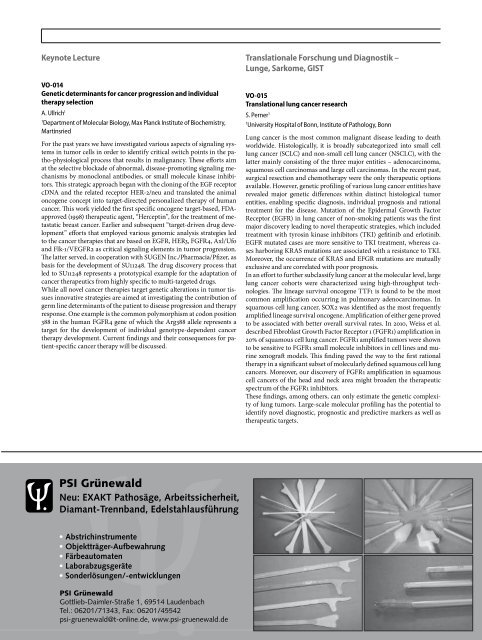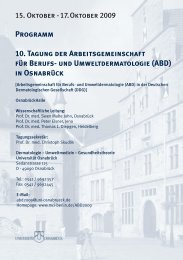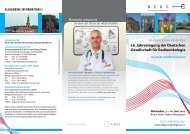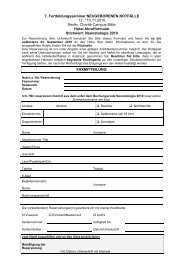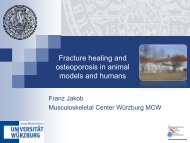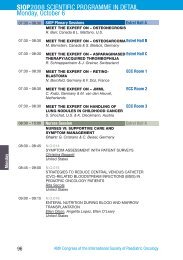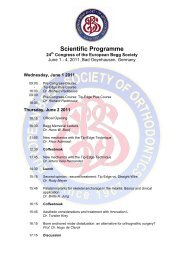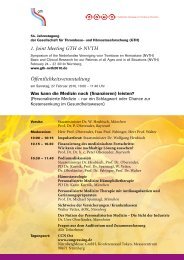96. Jahrestagung der Deutschen Gesellschaft für Pathologie e. V ...
96. Jahrestagung der Deutschen Gesellschaft für Pathologie e. V ...
96. Jahrestagung der Deutschen Gesellschaft für Pathologie e. V ...
You also want an ePaper? Increase the reach of your titles
YUMPU automatically turns print PDFs into web optimized ePapers that Google loves.
Keynote Lecture<br />
VO-014<br />
Genetic determinants for cancer progression and individual<br />
therapy selection<br />
A . Ullrich 1<br />
1Department of Molecular Biology, Max Planck Institute of Biochemistry,<br />
Martinsried<br />
For the past years we have investigated various aspects of signaling systems<br />
in tumor cells in or<strong>der</strong> to identify critical switch points in the patho-physiological<br />
process that results in malignancy. These efforts aim<br />
at the selective blockade of abnormal, disease-promoting signaling mechanisms<br />
by monoclonal antibodies, or small molecule kinase inhibitors.<br />
This strategic approach began with the cloning of the EGF receptor<br />
cDNA and the related receptor HER-2/neu and translated the animal<br />
oncogene concept into target-directed personalized therapy of human<br />
cancer. This work yielded the first specific oncogene target-based, FDAapproved<br />
(1998) therapeutic agent, “Herceptin”, for the treatment of metastatic<br />
breast cancer. Earlier and subsequent “target-driven drug development”<br />
efforts that employed various genomic analysis strategies led<br />
to the cancer therapies that are based on EGFR, HER3, FGFR4, Axl/Ufo<br />
and Flk-1/VEGFR2 as critical signaling elements in tumor progression.<br />
The latter served, in cooperation with SUGEN Inc./Pharmacia/Pfizer, as<br />
basis for the development of SU11248. The drug discovery process that<br />
led to SU11248 represents a prototypical example for the adaptation of<br />
cancer therapeutics from highly specific to multi-targeted drugs.<br />
While all novel cancer therapies target genetic alterations in tumor tissues<br />
innovative strategies are aimed at investigating the contribution of<br />
germ line determinants of the patient to disease progression and therapy<br />
response. One example is the common polymorphism at codon position<br />
388 in the human FGFR4 gene of which the Arg388 allele represents a<br />
target for the development of individual genotype-dependent cancer<br />
therapy development. Current findings and their consequences for patient-specific<br />
cancer therapy will be discussed.<br />
PSI Grünewald<br />
Neu: EXAKT Pathosäge, Arbeitssicherheit,<br />
Diamant-Trennband, Edelstahlausführung<br />
• Abstrichinstrumente<br />
• Objektträger-Aufbewahrung<br />
• Färbeautomaten<br />
• Laborabzugsgeräte<br />
• Son<strong>der</strong>lösungen/-entwicklungen<br />
PSI Grünewald<br />
Gottlieb-Daimler-Straße 1, 69514 Laudenbach<br />
Tel.: 06201/71343, Fax: 06201/45542<br />
psi-gruenewald@t-online.de, www.psi-gruenewald.de<br />
Translationale Forschung und Diagnostik –<br />
Lunge, Sarkome, GIST<br />
VO-015<br />
Translational lung cancer research<br />
S . Perner1 1University Hospital of Bonn, Institute of Pathology, Bonn<br />
Lung cancer is the most common malignant disease leading to death<br />
worldwide. Histologically, it is broadly subcategorized into small cell<br />
lung cancer (SCLC) and non-small cell lung cancer (NSCLC), with the<br />
latter mainly consisting of the three major entities – adenocarcinoma,<br />
squamous cell carcinomas and large cell carcinomas. In the recent past,<br />
surgical resection and chemotherapy were the only therapeutic options<br />
available. However, genetic profiling of various lung cancer entities have<br />
revealed major genetic differences within distinct histological tumor<br />
entities, enabling specific diagnosis, individual prognosis and rational<br />
treatment for the disease. Mutation of the Epi<strong>der</strong>mal Growth Factor<br />
Receptor (EGFR) in lung cancer of non-smoking patients was the first<br />
major discovery leading to novel therapeutic strategies, which included<br />
treatment with tyrosin kinase inhibitors (TKI) gefitinib and erlotinib.<br />
EGFR mutated cases are more sensitive to TKI treatment, whereas cases<br />
harboring KRAS mutations are associated with a resistance to TKI.<br />
Moreover, the occurrence of KRAS and EFGR mutations are mutually<br />
exclusive and are correlated with poor prognosis.<br />
In an effort to further subclassify lung cancer at the molecular level, large<br />
lung cancer cohorts were characterized using high-throughput technologies.<br />
The lineage survival oncogene TTF1 is found to be the most<br />
common amplification occurring in pulmonary adenocarcinomas. In<br />
squamous cell lung cancer, SOX2 was identified as the most frequently<br />
amplified lineage survival oncogene. Amplification of either gene proved<br />
to be associated with better overall survival rates. In 2010, Weiss et al.<br />
described Fibroblast Growth Factor Receptor 1 (FGFR1) amplification in<br />
20% of squamous cell lung cancer. FGFR1 amplified tumors were shown<br />
to be sensitive to FGFR1 small molecule inhibitors in cell lines and murine<br />
xenograft models. This finding paved the way to the first rational<br />
therapy in a significant subset of molecularly defined squamous cell lung<br />
cancers. Moreover, our discovery of FGFR1 amplification in squamous<br />
cell cancers of the head and neck area might broaden the therapeutic<br />
spectrum of the FGFR1 inhibitors.<br />
These findings, among others, can only estimate the genetic complexity<br />
of lung tumors. Large-scale molecular profiling has the potential to<br />
identify novel diagnostic, prognostic and predictive markers as well as<br />
therapeutic targets.


